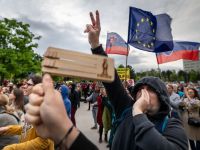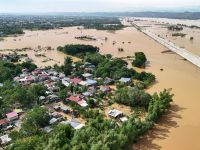A British foreign office spokesman Wednesday stressed that a military strike against Iraq could not be "ruled out" if Iraqi President Saddam Hussein continues to “defy the will of the international community.”
Speaking exclusively to the Kuwait news agency (Kuna) in London, the spokesman, however, made it clear that "nothing has been decided for the time being.”
The spokesman warned that the “Iraqi regime was still posing a threat to Kuwait and the international community by continuing to build weapons of mass destruction. He described these weapons as a continued menace to peace and security in the region and beyond.
On the return of the UN inspectors to Iraq, the foreign office spokesman reiterated the need for Baghdad to allow the experts from the new UN body (UNMOVIC) to enter Iraq to dismantle any remaining weapons of mass destruction.
In a related development, British sources questioned the effectiveness of the Iraqi opposition, suggesting that they are “not united to mount a real challenge to the regime in Baghdad which would lead to a democratic pluralistic administration in that country.”
Annan
UN secretary-general Kofi Annan did not seek permission from the Security Council before expressing his readiness to receive an Iraqi delegation to discuss "implementation of relevant...council resolutions," his spokesman Fred Eckhard said Tuesday.
Elaborating on the statement issued Monday following Annan’s meeting with Arab league secretary-general Amr Mousaa who delivered the Iraqi request, Eckhard told the daily briefing that Annan is "not required to consult with the Security Council members before answering." "He’s always open to discuss with a member state its desire to comply with Security Council resolutions," Eckhard noted.
However, he added, "You can assume he stays in regular touch with the council, mainly on matters of which they are seized. But I don’t think he requires their permission to meet with them (Iraqis)."
Asked about the agenda of the meeting, Eckhard said, "We assume that the general subject is Iraqi-UN. Cooperation. The bottom line issue for everyone, of course, is getting UN inspections back in Iraq to see if we can finish this monitoring exercise that could eventually lead to the lifting of sanctions."
Sanctions have been imposed on Iraq since August 6, 1990, four days after invading neighboring Kuwait. Asked how urgent these talks will be, the spokesman said "its as urgent as Iraq wants to make it. He is prepared to meet with them, so it is just a matter of fixing a date...at everyone’s earliest convenience."
Commenting on U.S. secretary of state Colin Powell’s statement that this round of talks should be "short", Eckhard said "I don’t think we can predict how long they’d take."
However, he added, "the secretary-general’s preference is that these talks be somewhat more focused than the first round of last February when Iraq went into considerable details to lay out their case and substantial documentation was presented."
"Now that this is behind us, the secretary-general hopes we can go to the next step to talk about more specific issues such as the return of the inspectors to Iraq."
In this context, diplomats speculate that Annan will include among his team Hans Blix, chairman of the UN monitoring, verification and inspection commission (UNMOVIC) when they are ready to discuss the return of UN inspectors. (Albawaba.com)







